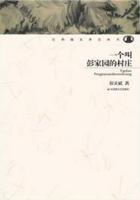It is hardly necessary to say that this gratifying and welcome strangeness, this lyric originality, is nearly all that M. De Banville has in common with the English poet whose two priceless volumes were published in the same year as "Les Cariatides?" The melody of Mr. Tennyson's lines, the cloudy palaces of his imagination, rose "As Ilion, like a mist rose into towers,"when Apollo sang. The architecture was floating at first, and confused; while the little theatre of M. De Banville's poetry, where he sat piping to a dance of nixies, was brilliantly lit and elegant with fresh paint and gilding. "The Cariatides" support the pediment and roof of a theatre or temple in the Graeco-French style. The poet proposed to himself "A cote de Venus et du fils de Latone Peindre la fee et la peri."The longest poem in the book, and the most serious, "La Voie Lactee," reminds one of the "Palace of Art," written before the after-thought, before the "white-eyed corpses" were found lurking in corners. Beginning with Homer, "the Ionian father of the rest," -"Ce dieu, pere des dieux qu'adore Ionie," -the poet glorifies all the chief names of song. There is a long procession of illustrious shadows before Shakespeare comes--Shakespeare, whose genius includes them all.
"Toute creation e laquelle on aspire, Tout reve, toute chose, emanent de Shakespeare."His mind has lent colour to the flowers and the sky, to "La fleur qui brode un point sur les manteau des plaines, Les nenuphars penches, et les pales roseaux Qui disent leur chant sombre au murmure des eaux."One recognises more sincerity in this hymn to all poets, from Orpheus to Heine, than in "Les Baisers de Pierre"--a clever imitation of De Musset's stories in verse. Love of art and of the masters of art, a passion for the figures of old mythology, which had returned again after their exile in 1830, gaiety, and a revival of the dexterity of Villon and Marot,--these things are the characteristics of M. De Banville's genius, and all these were displayed in "Les Cariatides." Already, too, his preoccupation with the lighter and more fantastic sort of theatrical amusements shows itself in lines like these:
"De son lit e baldaquin Le soleil de son beau globe Avait l'air d'un arlequin Etalant sa garde-robe;"Et sa soeur au front changeant Mademoiselle la Lune Avec ses grands yeux d'argent Regardait la terre brune."The verse about "the sun in bed," unconsciously Miltonic, is in a vein of bad taste which has always had seductions for M. De Banville. He mars a fine later poem on Roncevaux and Roland by a similar absurdity. The angel Michael is made to stride down the steps of heaven four at a time, and M. De Banville fancies that this sort of thing is like the simplicity of the ages of faith.
In "Les Cariatides," especially in the poems styled "En Habit Zinzolin," M. De Banville revived old measures--the rondeau and the "poor little triolet." These are forms of verse which it is easy to write badly, and hard indeed to write well. They have knocked at the door of the English muse's garden--a runaway knock. In "Les Cariatides" they took a subordinate place, and played their pranks in the shadow of the grave figures of mythology, or at the close of the procession of Dionysus and his Maenads. De Banville often recalls Keats in his choice of classical themes. "Les Exiles," a poem of his maturity, is a French "Hyperion." "Le Triomphe de Bacchus" reminds one of the song of the Bassarids in "Endymion" -"So many, and so many, and so gay."
There is a pretty touch of the pedant (who exists, says M. De Banville, in the heart of the poet) in this verse:
"Il reve e Cama, l'amour aux cinq fleches fleuries, Qui, lorsque soupire au milieu des roses prairies La douce Vasanta, parmi les bosquets de santal, Envoie aux cinq sens les fleches du carquois fatal."The Bacchus of Titian has none of this Oriental languor, no memories of perfumed places where "the throne of Indian Cama slowly sails."One cannot help admiring the fancy which saw the conquering god still steeped in Asiatic ease, still unawakened to more vigorous passion by the fresh wind blowing from Thrace. Of all the Olympians, Diana has been most often hymned by M. De Banville: his imagination is haunted by the figure of the goddess. Now she is manifest in her Hellenic aspect, as Homer beheld her, "taking her pastime in the chase of boars and swift deer; and with her the wild wood-nymphs are sporting the daughters of Zeus; and Leto is glad at heart, for her child towers over them all, and is easy to be known where all are fair" (Odyssey, vi.). Again, Artemis appears more thoughtful, as in the sculpture of Jean Goujon, touched with the sadness of moonlight. Yet again, she is the weary and exiled spirit that haunts the forest of Fontainebleau, and is a stranger among the woodland folk, the fades and nixies. To this goddess, "being triple in her divided deity," M. De Banville has written his hymn in the characteristic form of the old French ballade. The translator may borrow Chaucer's apology -"And eke to me it is a grete penaunce, Syth rhyme in English hath such scarsete To folowe, word by word, the curiosite Of Banville, flower of them that make in France.""BALLADE SUR LES HOTES MYSTERIEUX DE LA FORET"Still sing the mocking fairies, as of old, Beneath the shade of thorn and holly tree;The west wind breathes upon them pure and cold, And still wolves dread Diana roving free, In secret woodland with her company.
Tis thought the peasants' hovels know her rite When now the wolds are bathed in silver light, And first the moonrise breaks the dusky grey, Then down the dells, with blown soft hair and bright, And through the dim wood Dian thrids her way.















